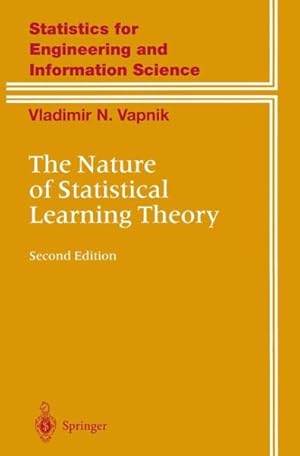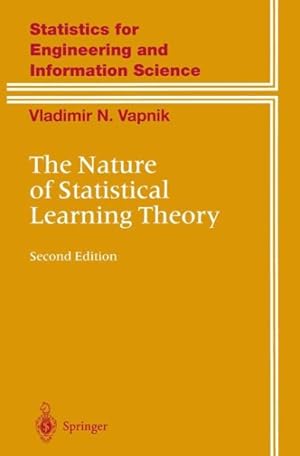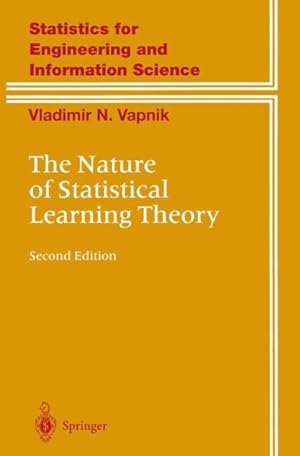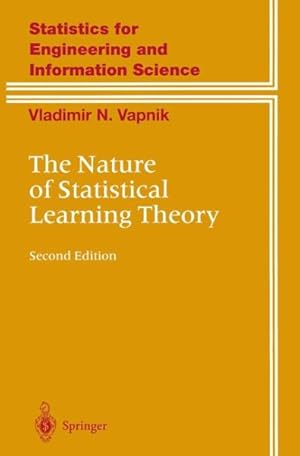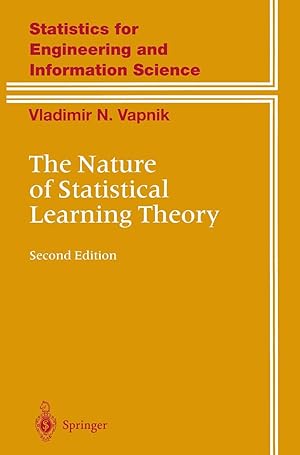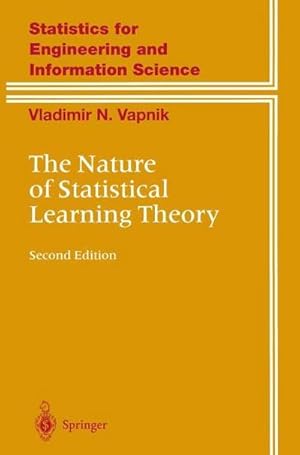Nature Statistical Learning Theory by Vapnik Vladimir (37 results)
Search filters
Product Type
- All Product Types
- Books (37)
- Magazines & Periodicals (No further results match this refinement)
- Comics (No further results match this refinement)
- Sheet Music (No further results match this refinement)
- Art, Prints & Posters (No further results match this refinement)
- Photographs (No further results match this refinement)
- Maps (No further results match this refinement)
- Manuscripts & Paper Collectibles (No further results match this refinement)
Condition Learn more
- New (25)
- As New, Fine or Near Fine (7)
- Very Good or Good (3)
- Fair or Poor (2)
- As Described (No further results match this refinement)
Binding
Collectible Attributes
- First Edition (No further results match this refinement)
- Signed (No further results match this refinement)
- Dust Jacket (No further results match this refinement)
- Seller-Supplied Images (17)
- Not Print on Demand (30)
Language (1)
Free Shipping
Seller Location
Seller Rating
-
Paperback. Condition: Good. No Jacket. Pages can have notes/highlighting. Spine may show signs of wear. ~ ThriftBooks: Read More, Spend Less.
-
Condition: Acceptable. The book is 100% readable but visibly worn, and damaged. This may include stains, tears, rips, folded pages, binding damage, dents, scuffs, scratches and sticker residue. The book also may contain heavy highlighting and notes. Please ask for photos as our books are donations and may not contain above mentioned defects. There is a signature or handwriting on the inside front cover.
-
THE NATURE OF STATISTICAL LEARNING THEORY
Published by Springer-Verlag New York Inc., 2000
ISBN 10: 0387945598 ISBN 13: 9780387945590
Language: English
Seller: Ammareal, Morangis, France
Hardcover. Condition: Bon. Ancien livre de bibliothèque avec équipements. Edition 2000. Ammareal reverse jusqu'à 15% du prix net de cet article à des organisations caritatives. ENGLISH DESCRIPTION Book Condition: Used, Good. Former library book. Edition 2000. Ammareal gives back up to 15% of this item's net price to charity organizations.
-
Hardcover. Condition: Like New. Like New. book.
-
The Nature of Statistical Learning Theory (Information Science and Statistics)
Published by Springer (edition 2nd), 1999
ISBN 10: 0387987800 ISBN 13: 9780387987804
Language: English
Seller: BooksRun, Philadelphia, PA, U.S.A.
Hardcover. Condition: Fair. 2nd. The item might be beaten up but readable. May contain markings or highlighting, as well as stains, bent corners, or any other major defect, but the text is not obscured in any way.
-
The Nature of Statistical Learning Theory (Information Science and Statistics)
Seller: HPB-Red, Dallas, TX, U.S.A.
hardcover. Condition: Good. Connecting readers with great books since 1972! Used textbooks may not include companion materials such as access codes, etc. May have some wear or writing/highlighting. We ship orders daily and Customer Service is our top priority!
-
The Nature of Statistical Learning Theory (Information Science and Statistics)
Seller: Solr Books, Lincolnwood, IL, U.S.A.
Condition: very_good. This books is in Very good condition. There may be a few flaws like shelf wear and some light wear.
-
The Nature of Statistical Learning Theory (Information Science and Statistics)
Seller: BennettBooksLtd, San Diego, NV, U.S.A.
hardcover. Condition: New. In shrink wrap. Looks like an interesting title!
-
Condition: New.
-
The Nature of Statistical Learning Theory (Information Science and Statistics)
Seller: Ria Christie Collections, Uxbridge, United Kingdom
Condition: New. In English.
-
The Nature of Statistical Learning Theory (Information Science and Statistics)
Seller: Ria Christie Collections, Uxbridge, United Kingdom
Condition: New. In.
-
Condition: New.
-
The Nature of Statistical Learning Theory (Information Science and Statistics)
Seller: Lucky's Textbooks, Dallas, TX, U.S.A.
Condition: New.
-
Condition: New.
-
Condition: New.
-
Condition: As New. Unread book in perfect condition.
-
The Nature of Statistical Learning Theory (Information Science and Statistics)
Seller: California Books, Miami, FL, U.S.A.
Condition: New.
-
The Nature of Statistical Learning Theory (Information Science and Statistics)
Seller: California Books, Miami, FL, U.S.A.
Condition: New.
-
Condition: As New. Unread book in perfect condition.
-
Taschenbuch. Condition: Neu. The Nature of Statistical Learning Theory | Vladimir Vapnik | Taschenbuch | xx | Englisch | 2010 | Springer US | EAN 9781441931603 | Verantwortliche Person für die EU: Springer Verlag GmbH, Tiergartenstr. 17, 69121 Heidelberg, juergen[dot]hartmann[at]springer[dot]com | Anbieter: preigu.
-
Gebunden. Condition: New. The aim of this book is to discuss the fundamental ideas which lie behind the statistical theory of learning and generalization. Written in readable and concise style and devoted to key learning problems, the book is intended for statisticians, mathematicia.
-
The Nature of Statistical Learning Theory
Published by Springer-Verlag New York Inc., US, 1999
ISBN 10: 0387987800 ISBN 13: 9780387987804
Language: English
Seller: Rarewaves.com USA, London, LONDO, United Kingdom
Hardback. Condition: New. Second Edition 2000. The aim of this book is to discuss the fundamental ideas which lie behind the statistical theory of learning and generalization. It considers learning as a general problem of function estimation based on empirical data. Omitting proofs and technical details, the author concentrates on discussing the main results of learning theory and their connections to fundamental problems in statistics. These include: * the setting of learning problems based on the model of minimizing the risk functional from empirical data * a comprehensive analysis of the empirical risk minimization principle including necessary and sufficient conditions for its consistency * non-asymptotic bounds for the risk achieved using the empirical risk minimization principle * principles for controlling the generalization ability of learning machines using small sample sizes based on these bounds * the Support Vector methods that control the generalization ability when estimating function using small sample size. The second edition of the book contains three new chapters devoted to further development of the learning theory and SVM techniques. These include: * the theory of direct method of learning based on solving multidimensional integral equations for density, conditional probability, and conditional density estimation * a new inductive principle of learning. Written in a readable and concise style, the book is intended for statisticians, mathematicians, physicists, and computer scientists. Vladimir N. Vapnik is Technology Leader ATandT Labs-Research and Professor of London University. He is one of the founders of.
-
Condition: New. pp. 336 2nd Edition.
-
Hardcover. Condition: new. Excellent Condition.Excels in customer satisfaction, prompt replies, and quality checks.
-
The Nature of Statistical Learning Theory
Published by Springer New York, Springer US, 2010
ISBN 10: 1441931600 ISBN 13: 9781441931603
Language: English
Seller: AHA-BUCH GmbH, Einbeck, Germany
Taschenbuch. Condition: Neu. Druck auf Anfrage Neuware - Printed after ordering - The aim of this book is to discuss the fundamental ideas which lie behind the statistical theory of learning and generalization. It considers learning as a general problem of function estimation based on empirical data. Omitting proofs and technical details, the author concentrates on discussing the main results of learning theory and their connections to fundamental problems in statistics. These include: \* the setting of learning problems based on the model of minimizing the risk functional from empirical data \* a comprehensive analysis of the empirical risk minimization principle including necessary and sufficient conditions for its consistency \* non-asymptotic bounds for the risk achieved using the empirical risk minimization principle \* principles for controlling the generalization ability of learning machines using small sample sizes based on these bounds \* the Support Vector methods that control the generalization ability when estimating function using small sample size. The second edition of the book contains three new chapters devoted to further development of the learning theory and SVM techniques. These include: \* the theory of direct method of learning based on solving multidimensional integral equations for density, conditional probability, and conditional density estimation \* a new inductive principle of learning. Written in a readable and concise style, the book is intended for statisticians, mathematicians, physicists, and computer scientists. Vladimir N. Vapnik is Technology Leader AT&T Labs-Research and Professor of London University. He is one of the founders of.
-
Condition: New. pp. 340 2nd Edition.
-
Condition: As New. Unread book in perfect condition.
-
The Nature of Statistical Learning Theory (Information Science and Statistics)
Seller: Mispah books, Redhill, SURRE, United Kingdom
Paperback. Condition: Like New. Like New. book.
-
Condition: As New. Unread book in perfect condition.
-
The Nature of Statistical Learning Theory
Published by Springer-Verlag New York Inc., US, 1999
ISBN 10: 0387987800 ISBN 13: 9780387987804
Language: English
Seller: Rarewaves.com UK, London, United Kingdom
Hardback. Condition: New. Second Edition 2000. The aim of this book is to discuss the fundamental ideas which lie behind the statistical theory of learning and generalization. It considers learning as a general problem of function estimation based on empirical data. Omitting proofs and technical details, the author concentrates on discussing the main results of learning theory and their connections to fundamental problems in statistics. These include: * the setting of learning problems based on the model of minimizing the risk functional from empirical data * a comprehensive analysis of the empirical risk minimization principle including necessary and sufficient conditions for its consistency * non-asymptotic bounds for the risk achieved using the empirical risk minimization principle * principles for controlling the generalization ability of learning machines using small sample sizes based on these bounds * the Support Vector methods that control the generalization ability when estimating function using small sample size. The second edition of the book contains three new chapters devoted to further development of the learning theory and SVM techniques. These include: * the theory of direct method of learning based on solving multidimensional integral equations for density, conditional probability, and conditional density estimation * a new inductive principle of learning. Written in a readable and concise style, the book is intended for statisticians, mathematicians, physicists, and computer scientists. Vladimir N. Vapnik is Technology Leader ATandT Labs-Research and Professor of London University. He is one of the founders of.






